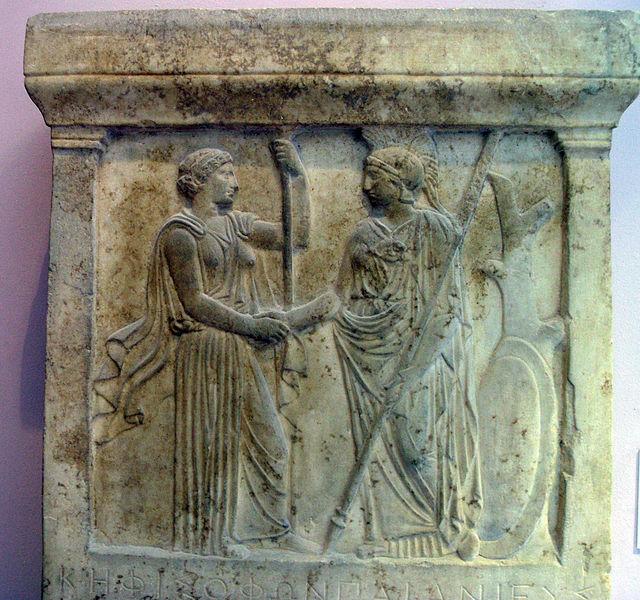I was wondering where the forearm handshake came from. I found absolutely nothing in Wikipedia, so I have no idea if this is really historically based or just a recent popular greeting. I was led to believe that it may have been used by European pre-roman age tribes.
-
1What is a "forearm handshake"?– Lennart RegebroCommented Sep 16, 2013 at 13:07
-
3I think he means the handshake you see sometimes in fantasy movies/TV shows where the two parties grasp each other's forearms. The only picture I could find online was this one– T.E.D. ♦Commented Sep 16, 2013 at 13:30
-
1Look up handshakes and recognitions for well-known secret societies. I cannot say more.– Pieter GeerkensCommented Sep 17, 2013 at 2:32
-
7@PieterGeerkens Well-known secrets? ;)– ApoorvCommented Sep 17, 2013 at 7:06
-
1@MonsterTruck That is indeed exactly what the masons are. Conspiracy theorists think it's all some secret powerful organization, when it is in fact more reminiscent of G.R.O.S.S.– Lennart RegebroCommented Sep 17, 2013 at 7:50
5 Answers
The earliest reference I can find comes from a 1937 commentary on Shakespeare's "Julius Caesar", although there are many later references that this handshake was taught to the actors by Lawrence Alma-Tadema in a 1898 staging of the play. It seems to have been often used in this play since, and I could find an example from a 2005 staging.
Almost all references to it is from 2010 and later, which probably is because "cool" teenagers seldom go to watch Shakespeare in a theatre. So this handshake didn't become a "thing" until it popped up in TV and Movies. It seems it is the TV-series "Spartacus" we have to blame/thank for this.
However, there are no Roman era depictions of this handshake that I can find, and there are plenty of depictions of ordinary handshakes from the Roman era, so we have to conclude that it's attribution as a roman handshake is a later invention. That probably goes for the handshake itself as well, although that's less certain.
It's probably invented in the theatre to make the handshake look dramatic, and the prime suspect is Alma-Tadema himself, although this is pure conjecture.
-
Have you checked out secret-society handshakes and recognitions? They are known to date back to the 1700's at least. Commented Sep 17, 2013 at 3:37
-
@PieterGeerkens: Yes. I can't find any even remotely reliable-looking source claiming this is one of those. Commented Sep 17, 2013 at 6:07
-
@Vector: Ah, yes. No I meant that it's attribution as a Roman handshake was later. I'll clarify that. I doubt that the TV series picked it up from a youth subculture, it's more likely they have seen it in some other movie about Romans. Perhaps it was even in Spartacus the movie? Commented Sep 17, 2013 at 6:32
-
1@LennartRegebro - +1 for excellent research and addressing the question head-on. But "It's probably invented in the theatre to make the handshake look dramatic, and the prime suspect is Alma-Tadema himself..." Your reference seems to indicate otherwise: "He taught the cast the wrist-group of the Roman Handshake" - the language indicates that there was already something known as the "The Roman Handshake" and Alma-Tadema simply taught it to the actors.– user2590Commented Sep 18, 2013 at 4:22
-
1The first time I saw a dramatic depiction of this was in the 1959 film of Ben-Hur. Commented Feb 19, 2018 at 16:41
The history section of the wikipedia article on handshakes suggests that the Greeks were familiar with the custom at least since the 5th century BC (because we have a sculpture showing Hera and Athena shaking hands that has been dated to the 5th century BC).
Romans also used handshake. It was depicted on Roman coins to symbolize agreement and compromise.
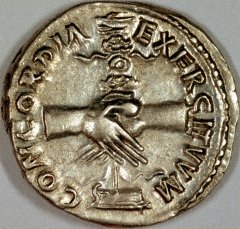
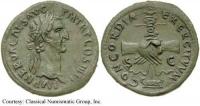
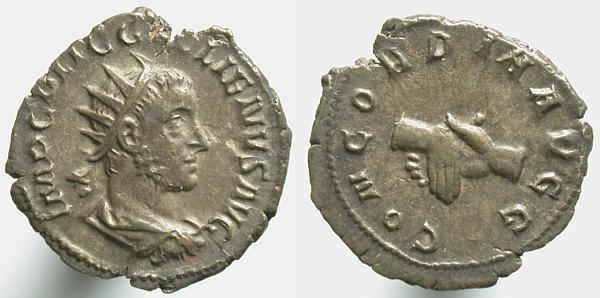
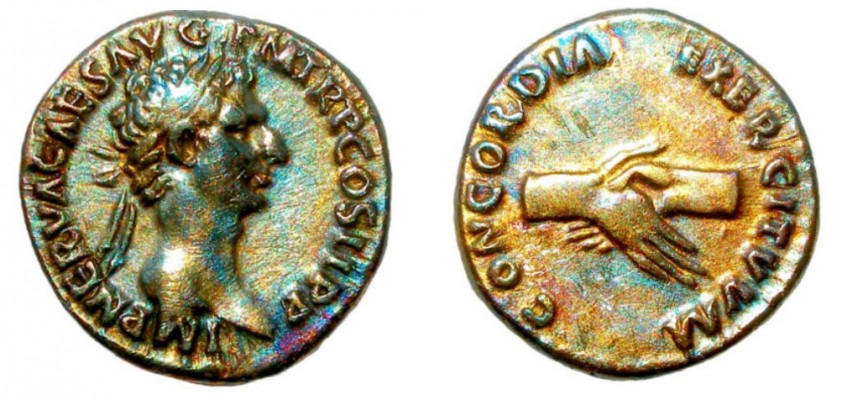
-
11Good answer as it goes, but has nothing whatsoever to say about the forearm-grip handshake (the subject of the question)– T.E.D. ♦Commented Sep 16, 2013 at 13:20
-
1If you change this answer to "The Romans used an ordinary handshake, so it's not Roman anyway" this would be a good answer, IMO. Commented Sep 17, 2013 at 8:32
-
The one person on the left in the relief seems to be a woman (look at chest and maybe the hair), so this may not be representative of a handshake which I have seen in movies about Roman soldiers greeting themselves.– jjackCommented Feb 22, 2018 at 19:47
-
1
-
1@Anixx : both are goddesses, and watch your words if you don't want to endure their wrath.– EvargaloCommented Oct 18, 2018 at 12:58
Here are two (not very good) references that attribute the forearm handshake to the Romans, if not earlier, along with other interesting background regarding the forearm handshake and similar variations on the common modern handshake:
Shaking hands is a relic of our ancient past. Whenever primitive tribes met under friendly conditions, they would hold their arms out with their palms exposed to show that no weapons were being held or concealed. In Roman times, the practice of carrying a concealed dagger in the sleeve was common so for protection the Romans developed the Lower-Arm-Grasp as a common greeting.
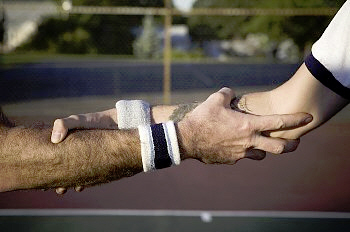
Lower-Arm-Grasp
I can recall being given instructions on “a proper handshake” by my uncle as a skinny little kid growing up in Brooklyn. I was told that the custom dated back to Roman times - when men grasped not only one’s hand, but the entire forearm to ensure that the person you were greeting had no hidden weapons. My interest in history, even at that young age, re-enforced my understanding that this social expression was something to be taken seriously. I pass on the instructions I received any time a child or adolescent offers me a half-hearted handshake. My wife is even more dedicated than I about such social education. Over the years, I’ve heard the “hand-shake origin story” shift to medieval times as well as ancient Egypt. Whatever the truth behind the tale, the fact remains that the ritual has been around, more or less, forever. There have been variations on it -from the “soul brother” clasp that began in the 60s, to the similar “brothers in arms” grasp first used by many Vietnam vets, to the countless adaptations created by diverse social groups
Unfortunately, these references don't bring reliable sources for their contentions, although I personally can attest to witnessing in NYC the variations cited by Jim Kent in the '60's and the Vietnam War era, and noting that they were new for that period. I always understood that such gestures are related to the gesture of reassuring or encouraging someone to be strong and stalwart by firmly grasping their arm or shoulder. The two parties exchange such a gesture, encouraging each other to be strong and united. This makes sense, given that this sort of greeting was particular to groups that considered themselves "comrades in arms", etc., and so perhaps this sort of thing hearkens back to some ancient form of warrior greeting. Admittedly though, this amounts to nothing more than interesting speculation.
I suppose I can lay claim to being a "primary source" on such a thing, and IMO, when we encounter such forms of greeting today, they date back to those 1960's forms, just as do many other contemporary customs and fashions.
-
Hmmm. Any info on this "northern European 'handshake'" from your second quote?– T.E.D. ♦Commented Sep 18, 2013 at 1:53
-
@T.E.D.- You will have to inquire of Zhōnghuá Mínguó, Diplomat, Republic of China. If your interest is that strong, there apparently is such a person: Go to that page I referred to and look for "Byzantium Imperium", which links to a profile on that site - there is some contact info there.– user2590Commented Sep 18, 2013 at 3:11
-
@Vector: There is such a person, he is playing the Nation-states simulation game. The first reference is by how the website looks, older than 2010, maybe even the 90's. The second two are not. And they are definitely not before the 19th century... :-) Commented Sep 18, 2013 at 8:11
-
@LennartRegebro - LOL. I saw that it was a site about that game - didn't realize that he's talking about his country in the game! Reference removed.– user2590Commented Sep 18, 2013 at 16:27
-
1@AL13N - Regardless, in this case it means you've asked a very good question.– user2590Commented Sep 24, 2013 at 1:09
It's not European. It's African & Middle Eastern. Prior to modern day plumbing. It was offensive to shake with the right hand. The right hand was/is used to clean ones self after secretion, so LEFT forearm shakes were done to avoid touching ones hand that was used to wipe themselves. Their a culture that respects hygiene. Not like here in the States. Certain men & women are known to never wash their hands after urinating & defecating. NASTY!
-
4
-
3This is plain wrong. The bad hand is the left hand. Always use RIGHT hand in the Middle East. Commented Jul 16, 2021 at 3:31
I have been taught that this form of handshake was brought about during the time of Vikings warriors would grab the forearm to prove and to feel for hidden daggers in case of assassination attempts...
